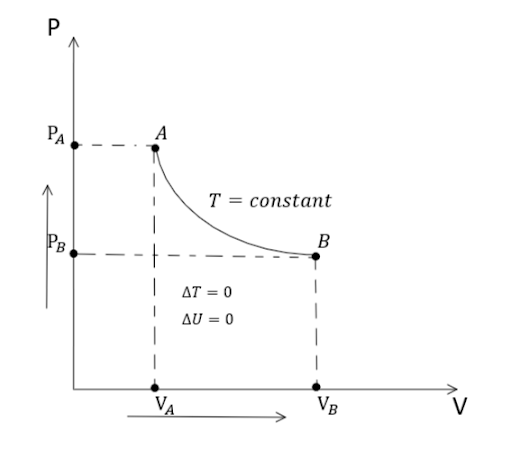
In an isothermal expansion
A. Internal energy of the gas decreases
B. Internal Energy of the gas increases
C. Internal Energy remains unchanged
D. Average kinetic energy of gas molecule decreases
Answer
233.1k+ views
Hint: In an Isothermal process in a thermodynamic system, the temperature is constant and at a constant temperature, the effect on the internal energy can be predicted by using the expression $U = f\left( T \right)$ as internal energy depends directly on the temperature for a perfect gas.
Complete step by step solution:
An isothermal process in thermodynamics is defined as the process during which the temperature $T$ of a system remains constant that’s why it is also referred to as a constant-temperature process. That is in an Isothermal process, $T = \text{constant}$ and $\text{Change in Temperature} = \Delta T = 0$
Since the relationship between internal energy and temperature is: -
$U = f\left( T \right)$ and as $T = \text{constant}$
$ \Rightarrow U = \text{constant}$ which means options (A) and (B) are incorrect.
Graphically, the above situation is represented as: -

Additionally, because the average kinetic energy of the gas molecules is proportional to its average temperature and because that temperature is constant during isothermal expansion, the average kinetic energy of the gas molecules will also remain constant, making option (D) incorrect. Thus, in an isothermal expansion, Internal Energy remains unchanged.
Hence, the correct option is C.
Note: In this problem, to determine which statement is correct with respect to an isothermal thermodynamic process, use $\Delta T = 0$ and hence, analyze every given option of internal energy and average kinetic energy of the gas molecule carefully to give an answer with a precise explanation.
Complete step by step solution:
An isothermal process in thermodynamics is defined as the process during which the temperature $T$ of a system remains constant that’s why it is also referred to as a constant-temperature process. That is in an Isothermal process, $T = \text{constant}$ and $\text{Change in Temperature} = \Delta T = 0$
Since the relationship between internal energy and temperature is: -
$U = f\left( T \right)$ and as $T = \text{constant}$
$ \Rightarrow U = \text{constant}$ which means options (A) and (B) are incorrect.
Graphically, the above situation is represented as: -

Additionally, because the average kinetic energy of the gas molecules is proportional to its average temperature and because that temperature is constant during isothermal expansion, the average kinetic energy of the gas molecules will also remain constant, making option (D) incorrect. Thus, in an isothermal expansion, Internal Energy remains unchanged.
Hence, the correct option is C.
Note: In this problem, to determine which statement is correct with respect to an isothermal thermodynamic process, use $\Delta T = 0$ and hence, analyze every given option of internal energy and average kinetic energy of the gas molecule carefully to give an answer with a precise explanation.
Recently Updated Pages
JEE Main 2023 April 6 Shift 1 Question Paper with Answer Key

JEE Main 2023 April 6 Shift 2 Question Paper with Answer Key

JEE Main 2023 (January 31 Evening Shift) Question Paper with Solutions [PDF]

JEE Main 2023 January 30 Shift 2 Question Paper with Answer Key

JEE Main 2023 January 25 Shift 1 Question Paper with Answer Key

JEE Main 2023 January 24 Shift 2 Question Paper with Answer Key

Trending doubts
JEE Main 2026: Session 2 Registration Open, City Intimation Slip, Exam Dates, Syllabus & Eligibility

JEE Main 2026 Application Login: Direct Link, Registration, Form Fill, and Steps

JEE Main Marking Scheme 2026- Paper-Wise Marks Distribution and Negative Marking Details

Understanding the Angle of Deviation in a Prism

Hybridisation in Chemistry – Concept, Types & Applications

How to Convert a Galvanometer into an Ammeter or Voltmeter

Other Pages
JEE Advanced Marks vs Ranks 2025: Understanding Category-wise Qualifying Marks and Previous Year Cut-offs

Laws of Motion Class 11 Physics Chapter 4 CBSE Notes - 2025-26

Waves Class 11 Physics Chapter 14 CBSE Notes - 2025-26

Mechanical Properties of Fluids Class 11 Physics Chapter 9 CBSE Notes - 2025-26

Thermodynamics Class 11 Physics Chapter 11 CBSE Notes - 2025-26

Units And Measurements Class 11 Physics Chapter 1 CBSE Notes - 2025-26




